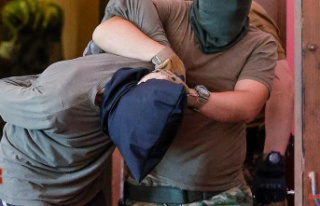There are increasing numbers of voices from Northern and Eastern Europe calling for a ban on Russians entering Europe. But Chancellor Scholz continues to fend off such advances. He doesn't want to make it difficult for members of the opposition who want to leave Russia to flee. Finland's Prime Minister Marin disagrees.
Chancellor Olaf Scholz remains skeptical about a general entry ban for Russians to Europe, despite corresponding demands from Northern and Eastern Europe. "This is Putin's war, not the Russians' war," said Scholz after a meeting with Scandinavian prime ministers in Oslo. It is right that this is being discussed in the EU. But one should not make it even more difficult for opposition Russians who wanted to go to Europe and many of whom were already in EU countries to flee.
On the other hand, the prime ministers of Finland and Denmark, Sanna Marin and Mette Frederiksen, said that a visa ban had to be discussed. Marin has previously said it was intolerable that Russians could vacation in the EU despite the ongoing attack on Ukraine. Swedish Prime Minister Magdalena Andersson said her government has not yet made a decision on the issue. There are good arguments for and against.
The meeting was also attended by Norwegian Prime Minister Jonas Gahr Store as host and Icelandic Prime Minister Katrin Jakobsdottir. Finland, Estonia and Lithuania had called for a visa ban because, as border countries with Russia, they get many visitors from the country. This has led to significant debates in these countries, also because visitors to EU countries stock up on goods that fall under EU sanctions.
Many also travel on to holiday destinations in the Schengen area. Poland is now also supporting a visa ban. This is likely to be discussed at the next meeting of EU foreign ministers. The Federal Foreign Office had pointed out that a visa ban would not only affect tourists, but also relatives of Russians or students living in Germany.












